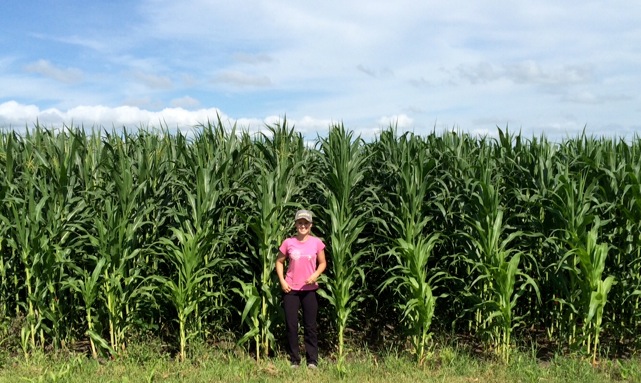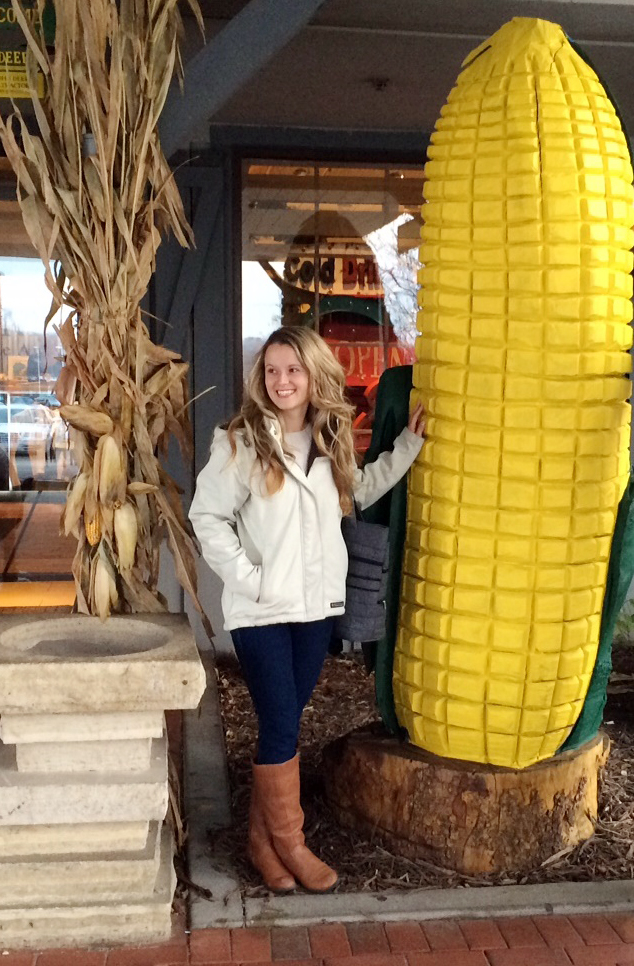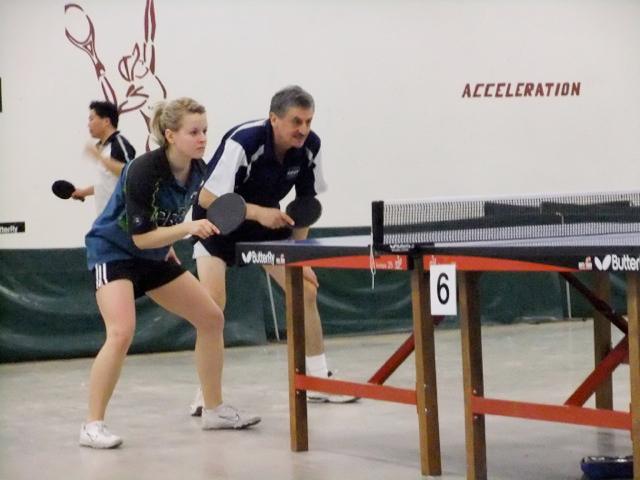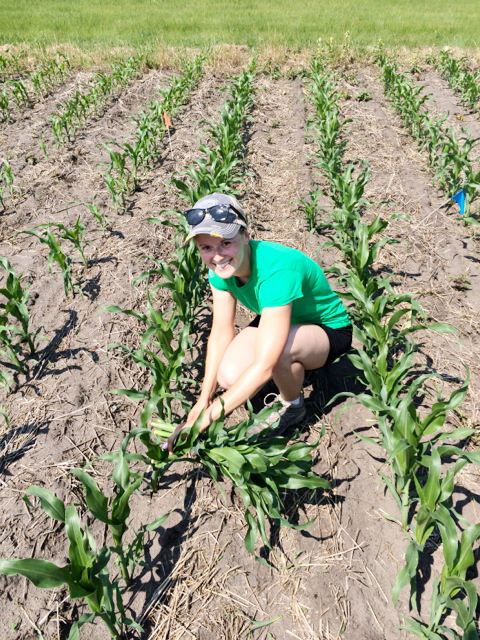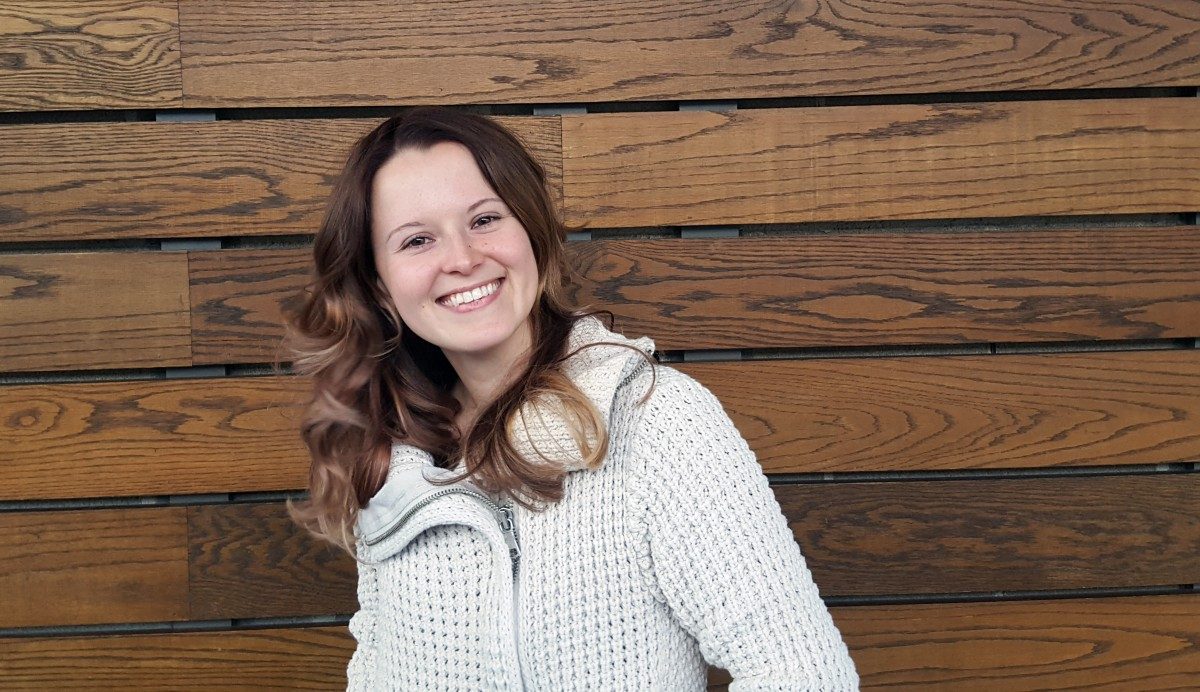
Magdalena Rogalsky // Photo: Sean Moore
CANDID: Magdalena Rogalsky
As her supervisor Don Flaten informed UM Today, Magdalena “Magda” Rogalsky is “a very capable young woman who is working on nutrient management in corn … a crop that’s nearly twice her height, but that that disparity in height doesn’t slow her down a bit,” the professor wrote. “She’s not only very bright, but she’s also a naturally gifted communicator.”
#understatement.
Master’s student: Magdalena Rogalsky
Studying in: Department of soil science
Advisor: Professor Don Flaten
UM Today: Where are you from?
Magdalena Rogalsky: Poland, originally.
When did you move here?
It’s been 14 years now.
Are you from a farming background?
My grandparents farmed but they had a very small farm. It was more just to sustain themselves. And that is the extent of it. I didn’t get exposed to agriculture until my third year of university.
What happened in third-year university?
I was in science at U of W and there’s not much agriculture there. I was studying biochemistry and biology. And then I started working as a summer student for the department of soil science at the U of M. And that was that. I was hooked.
What was it about soil that hooked you?
It was partially my boss at the time – Laryssa – who is now a very good friend of mine. She was just so passionate about agriculture and I guess it rubbed off. But also seeing the difference she was making for the farmers. Helping them make their production systems better. And the community itself. I have never worked with such great people, wherever you go. It’s just fantastic.
In her happy place
So you started with soil, how did you end up in corn research?
I actually started in canola, and then I did a little bit of potato work when I came back the following summer to do another summer session. And then I did soybeans for the third year, then a master’s project came up and it was corn. It wasn’t something I expected and I love it.
When you’re at a party and someone asks about your research, what do you say?
We’re looking at a fertilizer management practices for corn production in Manitoba. So we’re looking, basically, at the four Rs – right timing, right placement, right source and right rate for corn production.
Corn is an old crop. How do we not know this by now?
It has been around for a long time, in Manitoba it’s been here for a while but not to extent it has expanded to now. The acreage has increased in the past few years. So now that we have hybrids available that we can grow in our climate, that are shorter-season hybrids, we can work on the agronomic portion. That’s what I’m working on – the fertilizer. How do we feed this crop to get the best yields we can?
So corn acreage has been expanding in Manitoba but we’re not Iowa yet.
Are you going to do a PhD?
Not right away. I’d like to work first and get that real-life experience, and then maybe come back and do a PhD.
What did you want to be as a kid?
A police officer. Go figure. But my mom knocked that out of my head.
And replaced it with science?
Yeah. She was actually… I knew she used to work in a lab, but then I found out she did very similar work as what I did as a summer student. So maybe that’s where my desire comes from. So she used to be a soil scientists too.
Do you have any other hobbies outside of research?
I paint. I’m a painter.
Agricultural landscapes?
On request. But mostly abstract. And I used to be quite the table tennis player. I used to play provincially and nationally.
In Poland or here?
Team Manitoba. And then we went to national qualifiers and we lost.
How did you get into that sport?
My dad. Back in Poland we used to play. First of all, you should know, it’s called table tennis. Ping-pong is in your basement.
The Kusal-Rogalsky team
So if your friends say let’s play ping-pong, you know it’s a casual affair. If they say lets play table tennis, you’re grabbing your runners?
Yeah, and I’d whoop them.
What’s your favourite part of your job?
The fieldwork. Going out there, seeing the crop grow from seed. And watching it grow through mid-season to harvest. It’s so satisfying. And it helps when your hypothesis works out.
Let’s get controversial. GMOs. Yes, no or it’s complicated?
Of course yes. It’s not complicated at all. It’s very simple. But first of all, let’s start off with the fact that the term GMO is, I think, grossly misinterpreted in the public view. Because GMO is just ‘genetically modified organisms.’ Everything has been genetically modified through crossbreeding. What people are thinking of, I think, is the transgenic method of modifying crops, which is just selecting genes and transferring to another organism. And that is just so much more precise than what we have ever been able to do. I mean, prior to this we’d use radiation – beaming radiation onto a plant until it mutates (among other techniques). So we have gone this far and it’s a wonderful technology. It’s been around for a while but I think there needs to be more education out there to explain GMOs better to people. The corn I’m growing is GMO.
Do you eat of lot of corn yourself?
I grow a bit in my garden but that’s the extent of it. I’m not a farmer.
Would you ever want to be a farmer?
That would be my number one job. If I could farm, that’s what I would do.
Do you have any regrets in life?
None that I can think of. I’m pretty happy where I am and how I got here. There’s just been so many wonderful people on the way here that I’m thankful for.
And right now you’re in professor Don Flaten’s lab. Has he given you any good advice?
At the time I started my project with him I was getting married that summer. And he sat me down and said, ‘Magda, you are about to start the most important relationship in your life. The one between you and your supervisor.’
I’ll never forget that. He’s got a pretty good sense of humour. He’s a great supervisor and he cares very much about all his students and wants to see them all succeed.







